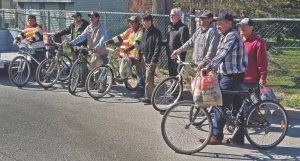
The people who come from other countries to work on Canada’s farms have never had it particularly easy—but the pandemic has added a sharp edge to the stressful conditions under which they work, says the Rev. Antonio Illas, the diocese of Niagara’s missioner to migrant farmworkers.
In addition to hard work and the vulnerability that comes with working in a foreign country, they also face with COVID-19 a risk to their lives and health, and to the income they need to provide for themselves and their families back home.
“If they test positive and are isolated, they are very stressed out. It’s very scary, because they won’t generate income,” Illas says. “It’s very ironic that the people who work in the field—the people who harvest for us, for the food security of the Canadian population—they themselves are very vulnerable in this pandemic.”
The migrant workers that Illas ministers to are not unique in this respect. Since COVID-19 began to spread through Canadian workplaces, the threats of death, illness and income insecurity have loomed larger over many on the front lines of Canada’s food sector—and the conditions under which they work have drawn increased attention.
Among the workplaces that have attracted national news coverage is the Cargill meat-processing plant in High River, Alta.—a massive facility that accounts for more than a third of Canada’s entire meat-packing capacity. The plant was shut down for two weeks in April after an outbreak of COVID-19, reported to be the largest known outbreak in any facility in North America. Nearly half of its 2,200 employees contracted the disease, two of whom died. A relative of a plant worker, visiting from the Philippines, also died of the illness.
A May CBC story reported that some employees (unnamed in the article, on the grounds that they feared reprisal for speaking publicly) were alleging unsafe practices, including having to work at close quarters with one another during the outbreak. According to the story, most of the workers at the plant are either immigrants or temporary foreign workers, and feared that the loss of their jobs would threaten their ability to remain in Canada.
The Anglican Journal attempted to arrange an interview with a Cargill employee, but was told he was not comfortable speaking to news media about the situation at the plant.
The facility reopened after bringing in a number of measures intended to boost employee safety, and by late August, the union that represents employees there said the company was being “generally responsive” to its concerns. Meanwhile, outbreaks occurred at several other meat-packing plants across Canada, including another Cargill plant in Calgary.
The coronavirus also spread among Canada’s migrant farmworkers.
In recent decades, as Canadian farm labour has grown increasingly scarce, farmers have increasingly turned to migrant workers from overseas. Many come under the federal government’s Temporary Foreign Worker Program, established in 1973.
As of late August, 1,300 workers had tested positive in Ontario alone, according to Justice for Migrant Workers, an advocacy group, and three had died. Complaints surfaced of poor conditions on some farms, including allegations of inadequate spacing between bunks in labourer lodgings.
One hotspot for the disease over the summer was the Windsor-Essex region of southern Ontario, which includes the town of Leamington, an agricultural hub known as the tomato capital of Canada. Since 2002, the Migrant Worker Community program, a Leamington-area charity, has offered a range of services to migrant farmworkers. Among its partners is the Anglican Church of St. John the Evangelist, which—until the pandemic hit—provided space for a welcome centre and volunteers to support it.
The Rev. Andrew Wilson, rector at St. John’s, says one of his concerns is a tendency for misinformation both about and among migrant workers to spread through hearsay. This has made it difficult for the workers to know with certainty what risks they face.
“If you go to any migrant community, they will all have the same prevailing fear of being kicked out of the country if they get sick or hurt,” he says. “We even had a fellow who came here who wanted to know what to do about his back, because he had hurt himself quite badly—but was afraid to tell anybody at work because he didn’t want to lose his job. Now would he? I don’t know, but it’s that rumour thing.”
An Immigration, Refugees and Citizenship Canada (IRCC) web page spells out the rights of migrant workers in Canada. According to law, employers cannot (among other things) force them to work if they are sick or injured, have them deported or have their immigration status changed.
“Migrant workers have the same rights to workplace protections under applicable federal, provincial and territorial employment standards and collective agreements as Canadians and permanent residents,” says Béatrice Fénelon, communication advisor for IRCC.
Advocates for migrant workers, however, argue that in practice, migrant workers don’t always enjoy the rights they’re entitled to by law. In early July, Ontario Premier Doug Ford said all but three or four workers on one farm in the Leamington area hid when health workers arrived to test for COVID-19. The workers, he said, were afraid that if they tested positive they’d lose their jobs or be sent home.
Complicating matters, Wilson says, is the fact that the conditions among which the migrants work and live, and the help they receive from their employers, can vary considerably.
“A friend of mine used to be a manager. If one of these guys were hurt, he would take them to the hospital and stay with them—that’s just what they did. But we also know through the organization that quite often if someone needs to go to a doctor they just get dumped—they drive them to Emergency, and go, ‘Red door—go through there.’ And there’s not a permanent translator at the hospital.”
And while many employers care deeply about how their workers have been coping with the pandemic, Wilson says, others—at least according to some allegations—haven’t allowed them to be tested.
A small group of farmworkers tends a field in Richmond, B.C., during the COVID-19 pandemic. Photo: D’Soleil Studios
The pay the migrants receive is good compared to what they would receive for the same work in their own countries, he says, and most of them seem to enjoy their time in Canada. On the other hand, some experience mental health problems because they spend so much time away from their homes and families—eight to 10 months of the year.
In a 2015 article a migrant farm worker in Niagara told the Anglican Journal his hourly pay of $11 per hour in Canada was a day’s wages in his home country of Mexico, and was the reason why he kept returning to Canada every year. But his repeated lengthy stints away from home had caused the breakdown of his marriage, he added.
Beyond the question of how their pay compares to what they’d receive at home, it’s also worth asking whether it’s equitable by Canadian standards, Wilson says. Agriculture is big in Leamington, and at least some local people have done very well by it.
“Two hundred trucks a day leave this community full of food—that’s a lot,” he says. “There’s a lot of money here. There’s a lot of Ferraris in town. That’s no exaggeration.”
Though the pandemic has meant increased stress for some of the vulnerable people in Canada’s food sector, it has also brought some action on the part of government. In July, the federal government announced it would spend $58.6 million in protections for migrant farmworkers—money that would go toward, among other things, increased government inspection of farms and the creation of mandatory requirements for worker housing. In August, Ontario Divisional Court restored an order by health authorities limiting the number of quarantining migrant workers in one Ontario county to three per bunkhouse. (The order had previously been successfully challenged by a farmer who argued it threatened Canada’s food supply.) The federal auditor general is also reported to be reviewing the policy governing migrant workers in Canada.
Fénelon says the federal government has been taking other measures also, including collaborating with the Canadian Red Cross and the province of Ontario to set up temporary living quarters to allow self-isolation of workers in the Windsor-Essex County area in which Leamington sits. The department is strengthening its inspections of worker sites, she says, and penalties for employers who don’t comply with regulations are stiff. Meanwhile, she says, a program in place since June 2019 has allowed foreign workers with employer-specific work permits who believe themselves to be mistreated by their current employer to apply for open work permits, which allow them to look for work with a different employer and may result in their old employer being investigated.
“The safety of foreign workers is a key priority for the government,” Fénelon says.
Some, however, say current policy doesn’t go far enough. Advocacy groups including KAIROS Canada—of which the Anglican Church of Canada is a member—have held protests this summer and fall in cities across Canada, calling for migrant workers to be given permanent residence. In a June letter to the federal government, Susan Bell, bishop of the diocese of Niagara, expressed her support for this position—which Illas says he wholeheartedly supports.
“The current system of temporary immigration status for migrant farmworkers, I believe, is unjust,” he says. “It doesn’t afford these migrant workers the opportunity to stay in Canada in retirement if they wanted to. I have a migrant worker who’s been coming to Canada for 31 years, and if he was to retire this season he doesn’t have a right to remain in Canada and enjoy retirement—he has to go back to Mexico.
“These migrant workers … they spend more time in Canada than in Mexico … and when they retire they have to go back.”
Permanent residents of Canada are entitled to most of the social benefits that Canadian citizens enjoy. They are also eligible to apply for Canadian citizenship.
The Anglican Church of Canada has been working to raise awareness of the plight of migrant workers in the food sector as well as other areas of the economy—in Canada and beyond, says Andrea Mann, the church’s director of global relations.
“National church initiatives with diocesan social justice leaders from coast to coast to coast have raised further issues of migrant labour exploitation in Canada’s food, natural resource and entertainment industries,” she says. “Collaboration with Anglican Communion groups and networks have deepened the church’s awareness and strengthened global solidarity for migrant justice.”
The origins of Illas’s ministry go back to 2013, when the Rev. Javier Arias, then rector of St. Alban’s Anglican Church in Beamsville, created an outreach ministry for local migrant workers, including a Spanish-language service followed by a communal meal. Over the years the project grew, partnering with other churches, businesses and organizations in the area to provide a range of services, including providing them with donated bicycles to help them get to their work sites. In 2018, the diocese of Niagara announced it would make it a regional ministry, hiring a full-time missioner. Illas has filled this role since the spring of 2019. The project has also been supported by the Anglican Foundation of Canada.
Social distancing requirements on buses have made bicycles—and the Bikes for Farmworkers program—increasingly important for migrant labourers. Photo: Contributed
As the pandemic has placed new strains on migrant farmworkers and new demands on their employers, Illas’s ministry has also changed. Before the pandemic started, the Migrant Farmworkers Project included, in addition to the bicycle service, Sunday mass and common meal, a clothing bank, a clinic providing free medical care by volunteers, farm visits and pastoral care to those who request it. Restrictions imposed since the beginning of the pandemic meant organizers could no longer offer the clothing bank, medical clinic and worship service, Illas says—but new forms of ministry arose in their place.
A donation of food from a local grocery wholesaler was the genesis, he says, for a grocery bag drop-off program. A grant by United Way Niagara, funded by the government of Canada, then allowed organizers to complement their usual grocery delivery with traditional Mexican food. They have also started delivering clothing to the workers to fill the need left by the closure of the clothing bank.
The bicycle ministry will likely continue to be critical to workers as the pandemic stretches on, Illas says. Before it hit, organizers were able to provide some transportation to workers in a school bus; other volunteers gave them a lift in their cars. But social distancing requirements have made this very difficult, Illas says—and the bicycle ministry therefore all the more critical.
When Illas talks about his ministry to other Anglicans, he often ends on the same note, he says.
“The next time you eat your apple, or your cherries or your fruits, be mindful that it’s hard migrant farmworker labour that made this possible,” he tells them.
“When you are at the communion table and you are partaking of the sacrament, when you are partaking of the blood of Christ through that wine, be mindful.… The flowers on the altar that we see every Sunday … be mindful of the hard, back-breaking labour of our migrant farmworkers in the fields and greenhouses that make those flowers possible.
“Without migrant farmworkers, Canada would be in desperate need of Canadians to go out to the fields and do this labour.”
Source: ANGLIAN JOURNAL



